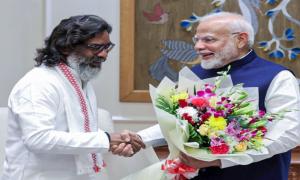Dr Mukul Sinha, the Ahmedabad-based lawyer of Janandolan, has initiated a move that can have a lot of impact on the issue of justice to the victims of the Gujarat riots.
Dr Sinha is cross-examining the witnesses deposing before the Nanavati Commission, which is looking into the riots.
On February 28, 2005, the third anniversary of the attack on the Sabarmati Express, which triggered the riots, Sinha has convened a meeting in Ahmedabad for "peace, justice and reconciliation".
He says it is time to build confidence amongst Hindus and Muslims and end the mistrust.
"The cases of Muslim riot victims are falling apart in courts," says Sinha. "We want reconciliation at the grassroots level to help the Muslim victims. We are handling their cases. We know how much they are suffering."
Sinha, who has spoken to representatives of the two communities, has a few suggestions:
- Let all cases related to the riots, except those concerning murder or rape/molestation, be compounded with the consent of all the accused, and let the accused be discharged. Any legal hurdle in achieving this goal should be overcome by amending the law.
- Withdraw all POTA charges from the cases that are left over.
- Set up special courts in each district to dispose off all compensation claims.
- Rehabilitate all victims -- rural and urban.
- Set up tripartite committees at the state as well as district levels. These should have representatives from both the communities and from the government to supervise all the above measures and bring about reconciliation at the grassroots level.
These suggestions, which will help more than 4,000 Hindu accused as well, are certainly going to be controversial. Many will dub them as "out of court settlements".
"If you settle these cases without seeking justice what about finding the truth?" asks political analyst Achyut Yagnik. "Truth should precede justice. Even in South Africa (when a commission was formed to hear the victims of the apartheid regime) it was known as Truth and Reconciliation Commission."
"The whole move is meaningless because Muslims who are arrested under POTA can't be set free unless the state withdraws the charges. In the case of riot cases the state itself was responsible for the riots. I fail to understand the strategy," he says.
Yagnik asks, "Why should we not know the truth about the role of the Gujarat police, RSS, VHP and the state itself?"
According to Sinha, except the Sabarmati Express case and the Akshardham shootout case, all other cases should be compounded and some kind of agreement arrived at.
He says, "We are having the bargaining chip. Muslims will not lose out anyway if we try to help POTA victims. What is the point in losing case after case? It is easy to talk about theories. But Muslims are suffering. What right people have to criticise when they are unaware of grassroots realities?"
Sinha says that he has talked to 40 muftis of Ahmedabad and scores of Muslim victims who wants "reconciliation".
Mukhtar Ahmed, a social worker serving the Muslim victims of Kalol in Panchmahal district, says, "This is a compromise. This will encourage riots. How can one indulge in riots and than compromise with the victims? What about process of law?"
However, he too agrees that the riot victims are nowhere near getting justice.
He says that in Panchmahal, more than 480 Hindu accused have been acquitted in 40 riot cases because the police investigations were weak.
In Panchmahal, 179 cases were registered and 66 of them were closed because the complaint was found baseless or victims could not provide enough information.
Later, some cases were reopened because of a Supreme Court judgment, but the police investigations have always been tardy, says Ahmed.
According to him, Sinha's move will "award injustice to victims instead of justice".
But Sinha adds, "I am aware of some reactions and I am open to the debate and ideas over the issue."
A source in the Gujarat government says that the Narendra Modi government is aware of Sinha's proposed meeting.
A senior Bharatiya Janata Party functionary says, "There are a large number of vested interest in India and abroad who don't want any kind of settlement between Hindus and Muslims of Gujarat. They will never allow Sinha or others to move towards reconciliation. Sinha's move may not succeed."








More from rediff